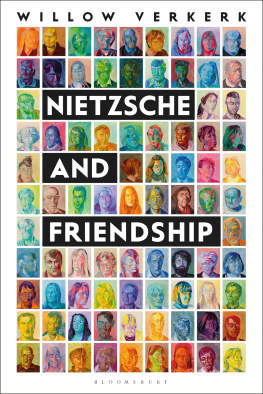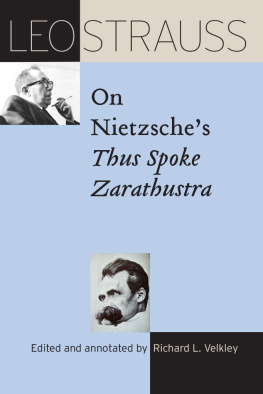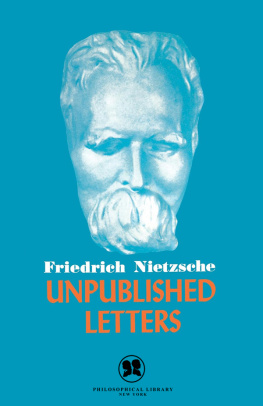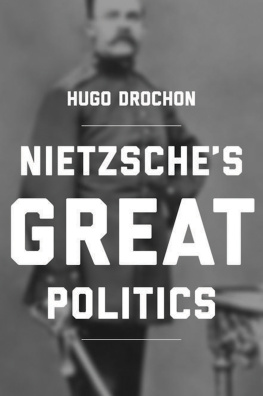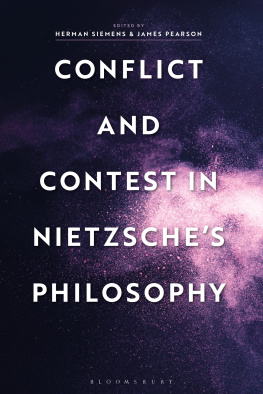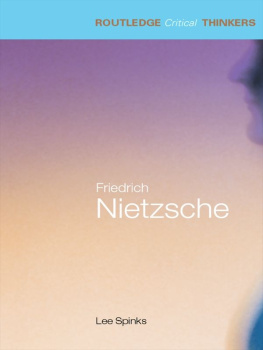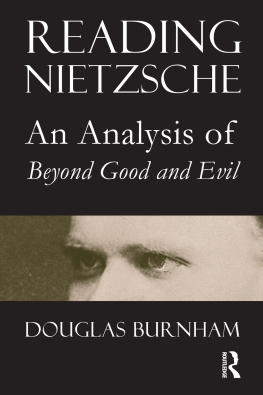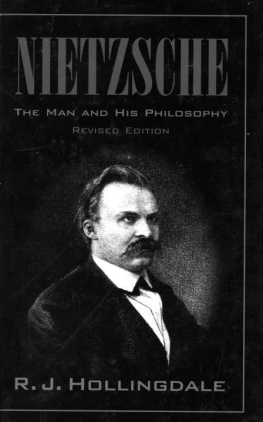Nietzsche and Friendship
Also available from Bloomsbury
Foucault and Nietzsche , Alan Rosenberg and Joseph Westfall
Heidegger and Nietzsche , Louis P. Blond
Interpreting Nietzsche , Ashley Woodward
Nietzsche as a Scholar of Antiquity , Anthony K. Jensen and Helmut Heit
The Nietzsche Dictionary , Douglas Burnham
Nietzsches Therapeutic Teaching , Horst Hutter and Eli Friedland
Nietzsche and Political Thought , Keith Ansell-Pearson
Nietzsche, Nihilism and the Philosophy of the Future , Jeffrey Metzger
Nietzsches Search for Philosophy , Keith Ansell-Pearson
For my mother Penelope, my greatest agonistic friend,
who continues to remind me of the importance of philosophical honesty.
Nietzsche and Friendship
Willow Verkerk

Contents
Early versions of chapters and sections of chapters of this book have been given as papers and talks at the University of Cologne, Kingston University, Chelsea College of Arts, University of Iceland, Simon Fraser University, Maison Gai Saber, the Nietzsche Circle, London Graduate School Summer Academy, Radboud University, and KU Leuven. I am thankful for the invitations and the feedback that I received from participants at these conferences, workshops, and events. A modified section from chapter 1 has appeared in the online journal of the New York Nietzsche Circle special issue, The Agonist X.II, Spring 2017 as Nietzsches Joyful Friendship: Epicurean Elements in the Middle Works. Chapter 2 uses material that was first published as Nietzsches Goal of Friendship, Journal of Nietzsche Studies 45.3, Autumn 2014 and other material published as Nietzsches Agonistic Ethics of Friendship, Symposium: Canadian Journal for Continental Philosophy 20.2, Fall 2016. Chapter 5 contains material that was published as On Love, Women, and Friendship: Reading Nietzsche with Irigaray, Nietzsche-Studien 46.1, 2017 and other material published in Philosophy Now 104 called Nietzsche on Love, 2014. Chapter 6 contains material first published as Transgendering Nietzsche: Male Mothers and Phallic Women in Derridas Spurs, philoSOPHIA: A Journal of Continental Feminism 7.1, Winter 2017.
I would like to express my gratitude to those who have helped me develop this research into its current form. I am thankful to Keith Ansell-Pearson, Sigridur Thorgeirsdottir, Stella Sandford, Paul van Tongeren, Herman Siemens, Carol Diethe, Babette Babich, Lawrence Hatab, Samir Gandesha, Steven Taubeneck, the reviewers of this manuscript, and the blind reviewers of the journal articles on Nietzsche that I have published. A special thanks to Horst Hutter my MA supervisor at Concordia University who introduced me to reading Nietzsche as a therapeutic philosopher. Thanks are due to my family and friends, Sophie Verkerk, Jane Brown, Steven Lane, Dilja Ivarsdottir, James DiFrisco, Jiho Kongo, Kat Staples, Nancy Lanthier, Liesbeth Schoonheim, Niki Lambros, Pierre Black, Noah Becker, and Leo Scott-Francis, who have supported me during the process. You are the people who have made me want to be a better friend.
Aristotle
EE The Eudemian Ethics , trans. Anthony Kenny (Oxford: Oxford University Press, 2011).
NE Nicomachean Ethics , trans. Terence Irwin (Indianapolis: Hackett Publishing, 1999).
Kant
LE Lectures on Ethics , trans. Peter Heath (Cambridge: Cambridge University Press, 1997).
Nietzsche
AC | The Antichrist , trans. Judith Norman (Cambridge: Cambridge University Press, 2005). |
AOM | Assorted Opinions and Maxims, in Human, All Too Human , trans. R. J. Hollingdale (Cambridge: Cambridge University Press, 1986). |
BGE | Beyond Good and Evil , trans. Walter Kaufmann (New York: Vintage, 1966). |
D | Daybreak , trans. R. J. Hollingdale (Cambridge: Cambridge University Press, 1997). |
EH | Ecce Homo , trans. Judith Norman (Cambridge: Cambridge University Press, 2005). |
GM | On the Genealogy of Morality , trans. Carol Diethe (Cambridge: Cambridge University Press, 1994). |
GS | The Gay Science , trans. Walter Kaufmann (New York: Vintage, 1974). |
HAH | Human, All Too Human , trans. R. J. Hollingdale (Cambridge: Cambridge University Press, 1986). |
HC | Homer on Competition, in On the Genealogy of Morality , trans. Carol Diethe (Cambridge: Cambridge University Press, 2008). |
KSA | Smtliche Werke: Kritische Studienausgabe , 15 vols, eds. Giorgio Colli and Mazzino Montinari (Berlin: Walter de Guyter, 1980). |
KSB | Smtliche Briefe: Kritische Studienausgabe , 8 vols, eds. G. Colli and M. Montinari (Berlin and New York: de Gruyter; Munich: dtv, 1986). |
WS | The Wanderer and His Shadow, in Human, All Too Human , trans. R. J. Hollingdale (Cambridge: Cambridge University Press, 1986). |
Z | Thus Spoke Zarathustra , trans. Graham Parkes (Oxford: Oxford University Press, 2009). |
In Thus Spoke Zarathustra , Nietzsche writes: I and Me are always too zealous in conversation: how could it be endured if there were no friend? (ZI On the Friend) For Nietzsche, we require friendship to endure life, to experience its joys more fully, and to heighten our learning capacities. Friendship has several therapeutic purposes in Nietzsches writings. It provides rest and repose for suffering, pushes one towards self-overcoming, and supports shared and individual creative generation.
Nietzsche draws on the received canon of Western philosophy, on thinkers such as Aristotle, Epicurus, Montaigne, and Kant, to formulate his reflections on friendship. We know that Nietzsche read these thinkers and was influenced by them by looking to his published works, his notebooks, as well as his library. These accounts, notably European and androcentric, are nevertheless the accounts of friendship which underlie and most often structure discourses on friendship in the history of philosophy, as well as in many contemporary philosophical discussions on friendship.
As a thinker of friendship, Nietzsche can be located both within and at the boundaries of this androcentric tradition because he subscribes to masculinist qualities of friendship while concurrently illuminating the gender inequalities pervasive in culture and how they disproportionately influence women. His illumination of these conditions which uses hyperbolic styles and conceptual provocations can be read as excessive and Dionysian which means they are both deconstructive and destructive. However, it should not be missed that Nietzsche is also giving us a constructive account of friendship because he writes to re-evaluate the meaning of friendship and the role it has in individual and cultural formation.
Nietzsches re-evaluation of friendship is closely related to his critique of nihilism and his concern that with the death of God people lack faith. Nietzschean friendship, founded in the methodologies of the free spirit, is conceived by him to provide new pathways for people to gather strength and test out their convictions so that they can refine their beliefs and ascertain new values as foundational for life. The methodologies of the free spirit that can be found in Nietzsches oeuvre include honesty (BGE 227), the relinquishment of certitude (GS 347), the destruction of habituated beliefs (HAH 225), and the pursuit of ones own source of experience (HAH 292). Although Nietzsche has more often been thought of as an individualist, rather than a thinker with an ethics of friendship, a growing body of research on Nietzsche has shown him to be a thinker interested in therapeutic, ethical, and political problems, such as self-identity, friendship, and gender.

